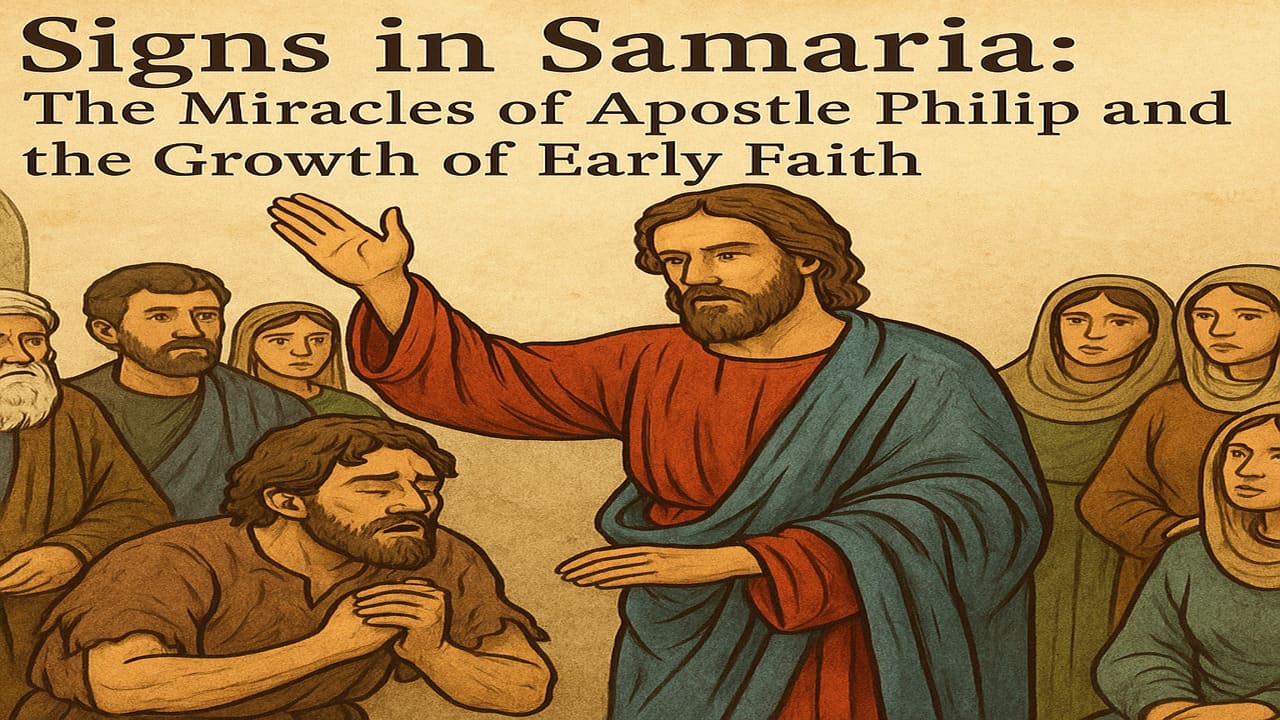
Thorn Ville Church – In the early years of the Christian church, Jerusalem was the center of teaching and fellowship. Yet persecution soon scattered believers into surrounding regions, creating opportunities for the Gospel to spread beyond the holy city. Among those who took this message further was Philip the Evangelist, one of the seven deacons appointed to serve the growing Christian community. His journey of Signs in Samaria marked a pivotal moment in the expansion of faith.
Samaria was a region often seen with suspicion by Jews because of its distinct cultural and religious practices. For Philip to minister there was not only bold but also groundbreaking. His message of Christ was accompanied by miraculous acts that made the Gospel tangible. These signs in Samaria captured the attention of both skeptics and seekers, transforming the region into fertile ground for faith.
Acts 8 describes how Philip performed remarkable miracles that convinced many of the truth of his message. People witnessed the healing of the sick, the casting out of unclean spirits, and the restoration of those long afflicted by suffering. These events were not isolated but occurred in public, giving undeniable credibility to Philip’s testimony about Christ.
Crowds gathered as lives were visibly changed. What made these miracles unique was not only the dramatic results but also the joy that followed. The people of Samaria, who had long lived under spiritual confusion and division, now experienced unity and hope. The miracles served as both physical relief and spiritual awakening, demonstrating that the power of God was at work in their midst.
Read More : Ananias and Sapphira: A Sobering Miracle of Truth and Judgment
The term “signs in Samaria” is more than a historical reference; it represents the undeniable proof that God’s kingdom had arrived in a new land. For the early church, miracles were not simply spectacles but confirmations of divine authority. Philip’s works showed that the Gospel was not bound by geography or ethnicity.
The signs also addressed the doubts of many. Samaritans, accustomed to different religious claims, needed something tangible to distinguish the message of Christ from competing voices. The healings and exorcisms provided that clarity. In a society filled with uncertainty, these acts of power offered reassurance that the Gospel was authentic and transformative.
As a result of Philip’s ministry, faith spread rapidly among the Samaritans. Men and women alike responded to his preaching and were baptized in large numbers. The miracles had softened their hearts, but it was the message of forgiveness and new life in Christ that brought lasting transformation. What began with signs soon became a community of believers committed to following the way of Jesus.
This growth also symbolized a larger theme in the early church: the breaking down of barriers. Jews and Samaritans had long distrusted one another, yet here was evidence that the Gospel was for all people. Philip’s work showed that Christianity was not an exclusive sect but a universal faith meant to reach every corner of the world.
The rapid spread of faith in Samaria was not without challenges. One of the most notable figures mentioned in Acts 8 is Simon the Sorcerer, a man who had long amazed the people with his magical arts. Simon himself believed and was baptized, but his subsequent request to purchase the power of the Holy Spirit revealed that true faith required humility, not ambition.
This confrontation highlighted an important distinction between genuine miracles and deceptive wonders. While Simon had manipulated crowds through illusion, Philip’s miracles were rooted in divine authority. The incident served as a warning to new believers that faith was not about control but surrender, not about spectacle but transformation.
Also Read : Haunted or Hoax? Shocking Accounts from Inside La Casa Matusita in Peru!
Instead of concluding, it is valuable to reflect on the continuing impact of Philip’s mission in Samaria. His work laid the foundation for the apostles Peter and John to later confirm the believers with the gift of the Holy Spirit. Together, their ministry established Samaria as one of the first regions outside Jerusalem to embrace Christianity.
The echoes of these events remind us of the enduring role of miracles in the growth of faith. Philip’s story demonstrates how God used both signs and preaching to establish the church in new territory. The signs in Samaria continue to symbolize the power of faith to cross boundaries, confront challenges, and bring hope to communities seeking truth.
Thornville Church - Your Source for Biblical Inspiration - Exploring the oldest places Christian worship offers profound insight into the…
Thornville Church - Your Source for Biblical Inspiration - Thousands of visitors journey each year to historic religious sites believed…
Thornville Church - Your Source for Biblical Inspiration - Long term fitness planning now determines how strong, mobile, and independent…
Thornville Church - Your Source for Biblical Inspiration - Ancient Christian pilgrimage destinations are reshaping ancient christian faith education by…
Thornville Church - Your Source for Biblical Inspiration - Romanesque churches early Europe menunjukkan bagaimana arsitektur batu massif membentuk praktik…
Thornville Church - Your Source for Biblical Inspiration - Archaeological insights book acts increasingly illuminate the historical landscape of the…